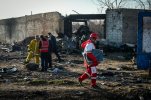Iran Admits It Shot Down Boeing Jet, Reversing Days of Denials
By Yasna Haghdoost and Arsalan Shahla
11 January 2020, 13:44 GMT+10 Updated on 11 January 2020, 17:36 GMT+10
Rescue workers search the wreckage of a Boeing Co. 737-800 aircraft, operated by Ukraine International Airlines, which crashed shortly after takeoff near Shahedshahr, Iran, on Jan. 8. Photographer: Ali Mohammadi/Bloomberg
Iran admitted it accidentally shot down a Ukrainian jetliner that it mistook for a threat during hostilities with the U.S., marking a dramatic reversal after repeatedly denying such a scenario and accusing Western governments of spreading lies.
Ukraine International Airlines Flight 752 was flying close to a sensitive Islamic Revolutionary Guard Corps military site when it was downed because of “human error,” the army said after conducting its own investigation. The “culprits” would be identified and referred to judicial authorities, it said.
The three-year-old
Boeing Co. 737-800 abruptly stopped transmitting its position and plunged to the ground about two minutes after takeoff from Tehran on Wednesday, killing all 176 aboard. The crash occurred hours after the Islamic Republic started launching rockets against Iraqi bases where U.S. forces are stationed, in retaliation for the killing of Iran’s top general, Qassem Soleimani.
“Iran’s armed forces went on high alert following U.S. threats to target Iranian sites,” the army said in the statement. “Under such highly sensitive and critical circumstances, the Boeing Flight 752 flew close to a sensitive IRGC military site at an altitude and angle that made it appear as a hostile target. The plane was hit due to human error and unintentionally.”
How U.S.-Iran Enmity Grew for Decades, Burst in Days: QuickTake
Iran will send the black boxes of the crashed jet to France as it lacks the technology to decode them, the state-run Islamic Republic News Agency reported. Military officials will elaborate on the crash on state media on Saturday.
Iranian Foreign Minister Javad Zarif blamed “human error at time of crisis caused by US adventurism” for the disaster, according to a post on Twitter. President Hassan Rouhani said the Islamic Republic “deeply regrets the disastrous mistake,” adding further investigations will be carried out into the incident and families of victims would be compensated.
Iran’s actions could threaten to further isolate the country. U.S. sanctions, particularly those aimed at stopping oil sales, have pushed the Iranian economy into recession, prompting Rouhani to accuse the U.S. of waging “economic war” against his country.
As recently as
Friday, Iran denied that it had fired a missile at the plane and accused western governments of “psychological warfare.” Officials in multiple western countries have said they believe it was shot down accidentally. A U.S. spy satellite detected the firing of two SA-15 surface-to-air missiles, a person familiar with the intelligence said, speaking on the condition of anonymity.
Ukrainian President Volodymyr Zelenskiy urged Iran to conduct a “complete and open investigation,” take action on those responsible, and pay compensation.
“The morning was not good today but it brought the truth,” Zelenskiy said on Saturday. “We hope further investigation will be done without artificial delays and obstacles.”
The White House didn’t immediately respond to a request for comment late Friday night.
Earlier: Ukraine Says Missile or Terrorist Responsible for Iran Jet Crash
There are no obvious military sites visible on satellite photos of the plane’s flight path. A power plant and an industrial park are in the area where the Ukrainian jet stopped transmitting its position, as well as large areas of undeveloped land, according to Google.
Rescue workers search the wreckage of a Boeing Co. 737-800 aircraft near Shahedshahr, Iran, on Jan. 8.
Photographer: Ali Mohammadi/Bloomberg
The plane appeared to fly on a normal path to the northwest of the airport on the same heading as the runway from which it departed, according to the flight-tracking service FlightRadar24.
It flew straight for just over two minutes after takeoff, according to the company. At that point, it made a slight turn to the right and continued for another 42 seconds. It disappeared at an altitude of about 7,900 feet, apparently after the radio transmitting its location lost power following the missile attack.
Iran Airports & Air Navigation Co. never received an order to cancel flights, and wasn’t ever made aware of any security issues, the company’s head Siavash Amir-Mokri told the Iranian Labor News Agency.
Accidental Downings
The disaster adds to a list of accidental shootings of civilian aircraft.
In 1988, a U.S. Navy missile cruiser, the U.S.S. Vincennes, downed an Iran Air Airbus A300 over the Persian Gulf, killing 290 passengers and crew. The U.S. military said it mistook the airliner for an Iranian fighter jet, an account disputed by Iran.
In July 2014, a Malaysian Airlines plane carrying 298 people was shot down by a Russian-made Buk surface-to-air missile fired from rebel-controlled territory in eastern Ukraine. The region was the site of a conflict between pro-Russia separatists and Ukrainian military forces, and two military aircraft had been downed just days earlier, an international team concluded.
This week’s tragedy strikes during a deeply challenging period for Boeing, gripped by one of the worst crises in its 103-year history after two deadly crashes involving the 737 Max led to its global idling in March. Iran’s admission of the missile strike relieves concerns of a mechanical failure that could affect other Boeing planes.
A CBS News crew earlier found the impact site unguarded and unsecured, with virtually all pieces of the plane cleared away and scavengers picking through the remaining debris.
— With assistance by Alan Levin, Siraj Datoo, John Harney, and Jon Morgan
(Updates with Ukraine president’s comments in paragraph nine)


